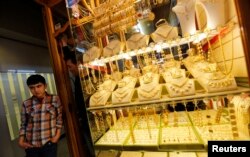KILIS, TURKEY —
The busy market district of Kilis in southeast Turkey is full of Syrian refugee children, repairing household goods, serving baklava and selling jewelry to become the main breadwinner of their families because their parents struggle to find jobs.
The civil war in neighboring Syria has killed more than 140,000 people and driven 2.5 million abroad, at least 700,000 of whom have been formally registered in Turkey under its "open door" policy reflecting support for the Syrian uprising.
But the total number of Syrians in Turkey is believed to be much higher and the influx has transformed the southern borderlands, with many Syrian grocery shops selling all their home brands and property prices sky-rocketing.
It has also put a strain on the local education system with Syrian parents complaining that schools cannot take any more students.
More than 220,000 Syrians are living in Turkish camps but the vast majority live outside them, without official permission to work. But they do not have to heed camp curfews and so some manage to land informal jobs on farms or construction sites, commonly accepting lower wages than Turkish counterparts.
Only 14 percent of Syrian children living outside the camps go to school, according to Turkey's Disaster and Emergency Management Directorate (AFAD), with the majority taking up work, however minimally paid, to help sustain their families.
Yehya, a 12-year-old Syrian boy from Azaz, a town near Syria's northern frontier with Turkey, works in a photography studio in a dilapidated mall around the corner from a string of gold shops in the market district.
He runs memory cards and photos to and from the printers for a weekly wage of 35 lira ($16) - having just got a pay rise. He said he missed school in Syria, where religion was his favorite subject because "it teaches us how to live right", but he had little choice but to take up any work available.
"My father worked for a couple of days [as a security guard] but now he has no job," he said shyly. "We are five boys and two girls and four of us work, to support our family."
Yehya complained that there is no space for him at Turkish schools and he did not know if qualifications at Turkey's 80 or so Syrian schools, concentrated in Istanbul and the southeast, would count for anything in the future, a concern echoed by middle-class Syrian mothers among the refugees.
He works alongside 13-year-old Hassan, who is from an educated family and has become a whiz at Photoshop in the studio. Hassan's father is a teacher and his mother Najla was a women's activist in the southern Syrian town of Deraa, near the Jordanian border, where the popular uprising against Syrian President Hafez al-Assad took shape in March 2011.
Hassan's family fled after some of Najda's friends and fellow protesters were imprisoned. Najla said she sends Hassan, who is neatly dressed and softly spoken, to work after school to keep him out of trouble.
"The environment here is different," Hassan said with his eyes down. "Sure, I've made some friends but I have made more enemies," alluding to tension and bullying among different groupings of refugees.
Syrian children boost gold trade
At one gleaming window in a covered lane of gold jewelry shops, Yehya's 17-year-old brother Mahamet has learned enough Turkish to serve as translator for Arabic-speaking shoppers.
His boss Seyfettin Koseouglu said thanks to Syrian refugees, his sales have doubledin the last two years.
"In the first year they didn't really know what to do. But since then, Syrian families often have six or seven children that go out to work. That could be an income of 50 lira for each of them a week," he said with a grin outside his shop window.
"Turks who make money save it, but Syrians - they spend it on gold!" he added, patting the head of 13-year-old Abdulrahman, another Syrian boy he employs who has quickly mastered Turkish.
Abdulrahman says all his siblings are trying to work but if he were in Syria, he would be having a more normal life going to school, where Arabic was his favorite subject.
It is mandatory to finish secondary school in Turkey, normally at the age of 17. This is a legal gray area for Syrians as they are classified merely as "guests" by the Turkish state, but few people are willing to acknowledge children are working.
While Syrian children in the Kilis market serve their customers with smiles and feel gratitude towards their Turkish bosses, they remember their lives in pre-war Syria with sadness.
"Whatever life is like here, Syria is our country," Yehya said.
($1 = 2.2 Turkish liras)
The civil war in neighboring Syria has killed more than 140,000 people and driven 2.5 million abroad, at least 700,000 of whom have been formally registered in Turkey under its "open door" policy reflecting support for the Syrian uprising.
But the total number of Syrians in Turkey is believed to be much higher and the influx has transformed the southern borderlands, with many Syrian grocery shops selling all their home brands and property prices sky-rocketing.
It has also put a strain on the local education system with Syrian parents complaining that schools cannot take any more students.
More than 220,000 Syrians are living in Turkish camps but the vast majority live outside them, without official permission to work. But they do not have to heed camp curfews and so some manage to land informal jobs on farms or construction sites, commonly accepting lower wages than Turkish counterparts.
Only 14 percent of Syrian children living outside the camps go to school, according to Turkey's Disaster and Emergency Management Directorate (AFAD), with the majority taking up work, however minimally paid, to help sustain their families.
Yehya, a 12-year-old Syrian boy from Azaz, a town near Syria's northern frontier with Turkey, works in a photography studio in a dilapidated mall around the corner from a string of gold shops in the market district.
He runs memory cards and photos to and from the printers for a weekly wage of 35 lira ($16) - having just got a pay rise. He said he missed school in Syria, where religion was his favorite subject because "it teaches us how to live right", but he had little choice but to take up any work available.
"My father worked for a couple of days [as a security guard] but now he has no job," he said shyly. "We are five boys and two girls and four of us work, to support our family."
Yehya complained that there is no space for him at Turkish schools and he did not know if qualifications at Turkey's 80 or so Syrian schools, concentrated in Istanbul and the southeast, would count for anything in the future, a concern echoed by middle-class Syrian mothers among the refugees.
He works alongside 13-year-old Hassan, who is from an educated family and has become a whiz at Photoshop in the studio. Hassan's father is a teacher and his mother Najla was a women's activist in the southern Syrian town of Deraa, near the Jordanian border, where the popular uprising against Syrian President Hafez al-Assad took shape in March 2011.
Hassan's family fled after some of Najda's friends and fellow protesters were imprisoned. Najla said she sends Hassan, who is neatly dressed and softly spoken, to work after school to keep him out of trouble.
"The environment here is different," Hassan said with his eyes down. "Sure, I've made some friends but I have made more enemies," alluding to tension and bullying among different groupings of refugees.
Syrian children boost gold trade
At one gleaming window in a covered lane of gold jewelry shops, Yehya's 17-year-old brother Mahamet has learned enough Turkish to serve as translator for Arabic-speaking shoppers.
His boss Seyfettin Koseouglu said thanks to Syrian refugees, his sales have doubledin the last two years.
"In the first year they didn't really know what to do. But since then, Syrian families often have six or seven children that go out to work. That could be an income of 50 lira for each of them a week," he said with a grin outside his shop window.
"Turks who make money save it, but Syrians - they spend it on gold!" he added, patting the head of 13-year-old Abdulrahman, another Syrian boy he employs who has quickly mastered Turkish.
Abdulrahman says all his siblings are trying to work but if he were in Syria, he would be having a more normal life going to school, where Arabic was his favorite subject.
It is mandatory to finish secondary school in Turkey, normally at the age of 17. This is a legal gray area for Syrians as they are classified merely as "guests" by the Turkish state, but few people are willing to acknowledge children are working.
While Syrian children in the Kilis market serve their customers with smiles and feel gratitude towards their Turkish bosses, they remember their lives in pre-war Syria with sadness.
"Whatever life is like here, Syria is our country," Yehya said.
($1 = 2.2 Turkish liras)






